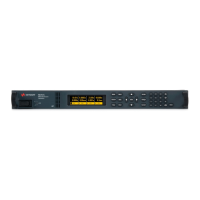Note that both Rise and Fall commands use the same resolution; which is determined by whichever
delay time (fall or rise) is the longest.
Parameter Typical Return
0 - 1023, *RST 0 <delay value>
Sets a delay of 0.5 s before turning the output on: OUTP:DEL:RISE 0.5, (@1)
Sets a delay of 0.2 s before turning the output off: OUTP:DEL:FALL 0.2, (@1)
l Each power module exhibits a minimum delay offset that applies from the time that a command to
turn on the output is received until the output actually turns on. If you specify a turn-on delay, this
delay will be added to the minimum delay offset, resulting in a turn-on delay that is actually longer
than the one you programmed.
l Use OUTput:COUPle:MAX:DOFFset? to query the delay offset that is required for each instrument.
OUTPut[:STATe]:PMODe VOLTage|CURRent, (@<chanlist>)
OUTPut[:STATe]:PMODe? (@<chanlist>)
Selects the preferred mode for output on or output off transitions. It allows output state transitions to
be optimized for either constant voltage or constant current operation. Turn-on and turn-off
overshoots are minimized for the preferred mode of operation.
Voltage - minimizes output on/off voltage overshoots in constant voltage operation.
Current - minimizes output on/off current overshoots in constant current operation.
Parameter Typical Return
VOLTage|CURRent, *RST VOLTage VOLT or CURR
Sets the preferred mode to CURRent: OUTP:PMODE CURR, (@1)
OUTPut[:STATe]:TMODe HIGHz|LOWz, (@<chanlist>)
OUTPut[:STATe]:TMODe? (@<chanlist>)
Specifies the output impedance mode at turn-off.
HIGHz - sets the output to a high impedance mode at turn-off. In high impedance mode, the output
relays are opened while the output remains at its set value.
LOWZ - sets the output to a low impedance mode at turn-off. In low impedance mode, the output is
first down-programmed to zero, after which the output relays are opened.
Parameter Typical Return
HIGHz|LOWZ, *RST HIGHz HIGHor LOWZ
Sets the turn-off mode to high impedance: OUTP:TMODE HIGH, (@1)
Keysight N6700C Operating and Service Guide 267
5 SCPI Programming Reference

